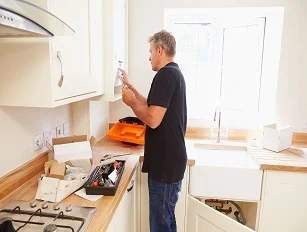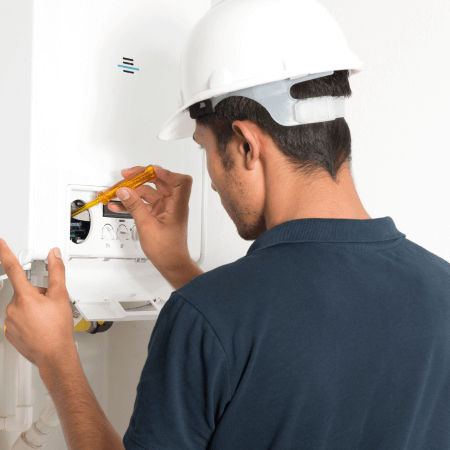If you're new to the world of buy-to-lets and have taken advantage of the Stamp Duty Holiday, you may be feeling excited at the prospect of starting your new venture and also a little daunted by all the legal obligations that come with being a landlord.
A working heating system is one of the main requirements for private landlords when letting out properties. Under new laws, properties must not only be regularly maintained but energy-efficient too.
For new private landlords it can be difficult to know how to choose a heating system that's both efficient and desired by tenants – therefore being a cost-effective investment. But that's where we come in. We're renowned for our expertise and have a passion for energy efficiency, which is why we've put together these heating tips for new landlords.

Landlord heating obligations
There are many obligations and duties that landlords should meet to ensure their properties are safe and habitable, but one of the latest landlord responsibilities is with regards to the heating of the home.
In the UK, private landlords must:
- Provide access to functioning sources of heat and hot water under the Landlord and Tenant Act.
- Provide heating in every occupied room of the property.
- Ensure any room designated as a bedroom can be heated at 18°C minimum and living rooms at 21°C if the temperature outside is -1°C.
- Ensure that any reported heating problems are dealt with within a few days after notification.
- Bleed the radiators at the start of the tenancy – after which it is the tenant's responsibility.
- Be responsible for major repairs of the appliances unless damage was caused by the tenant's negligence.
Energy efficiency in the private rental sector
The latest regulations that came into force in June 2020 are designed to help improve the safety and security of housing in the private rental sector. Under this new legislation, landlord responsibilities include:
- Performing electrical safety inspections before the start of a new tenancy. The electrical inspection must be carried out at least every 5 years by a certified electrician.
- Supplying tenants with a copy of the report within 28 days. If it's a new tenancy, the report should be supplied before the occupation.
- Providing local authorities with a copy of the report within 7 days.
- Carrying out repair work within 28 days if any defects that require immediate action are identified.
- Providing the tenant and the local authorities with the written confirmation from the electrician who performed the repair within 28 days.
Alongside these obligations, under the government’s energy efficiency proposal, private landlords must ensure their properties have an Energy Performance Certificate (EPC) level of C. While these won't be coming into effect for a few years, it's wise for landlords to start making the changes now before the 1 April 2025 deadline.
Electric vs gas heating
Gas central heating is the most common form of heating system. Using a gas-fired boiler heats the water and spreads it through the radiators. Often preferred by tenants because of the low costs, for landlords the maintenance of gas central heating boilers can be pricey.
If your property has gas installations, you must conduct an annual Gas Safety Check.
While gas is a relatively cheap fuel, it's not energy efficient. Because most gas systems only have one thermostat, you're more likely to raise the temperature in the whole property even if you want to make only one room warmer. However, upgrading to a smart thermostat might offer you the perfect solution.
Electric heating systems often include storage heaters, convection heaters or boilers. Storage heaters are designed to store the heat during the cheapest electric tariff period. However, if your tenants spend most of their time away from the property this might not be convenient for them. Convection heaters tend to generate high electricity costs and can put prospective tenants off.
Electric central heating boilers are ideal for homes with restricted access to the grid, but also require the installation of a water tank and radiators. Whereas electric heaters only require a working socket!
Because electric central heating doesn’t use as much fuel, it makes it more energy efficient. In addition, modern electric heating systems allow you to individually control each radiator separately, which results in more efficient electricity consumption.
Tips for helping rental properties stay warm
Besides the heating systems you choose to install, there are a few other ways you can help your rental properties stay warm.
Choose lined curtains and blinds
Even if you're choosing to let out your property unfurnished, you might want to consider window dressings. Blinds and curtains are brilliant at keeping in the heat when they're closed -especially if they're made from a thick, insulating material. If possible, double up with blinds and curtains on each window. This additional layer can help retain much more heat.
Think of the flooring
Uninsulated floors can be a key reason why rooms don't warm up. Electric underfloor heating kits are simple to install and an effective way of heating up any room. Thick carpets and additional rugs are also a cheap and easy way you can improve heat retention.
Maintenance
The key to being a successful private landlord is ensuring your properties are maintained to the highest of standards. Not only will this help keep the property occupied but in the long run will help keep repair costs down as any problems can be fixed before they become too costly.
When maintaining the property make sure you are clear on what is your responsibility and what is the tenant’s (this should be set out clearly in the tenancy agreement).
Here at City Plumbing we have everything you need to ensure your rental properties are not only pleasant spaces to live but are also energy (and cost) efficient too. Shop online or find your nearest branch.
Other articles

A homeowners’ guide to central heating systems
22 Mar 2022 ・ 9 mins

Things you should check if your boiler isn’t working
22 Mar 2022 ・ 8 mins

Radiator Buying Guide: which radiator should you choose?
22 Mar 2022 ・ 7 mins



